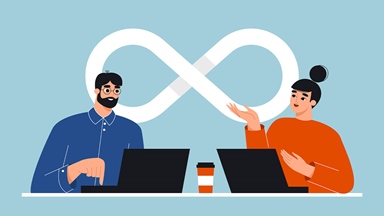Loading component...
At a glance
Agile quiz: How much do you know about agile project methodology?
1. In a nutshell, agile methodology is:
A. Relevant only to software developers
B. A project management philosophy for delivering work in small, consumable increments
C. A workflow that provides visibility to every stage of the project
D. A project management philosophy for delivering work in sequential stages until everything is approved
2. Which of the following companies uses agile?
A. Apple
B. Microsoft
C. Lego
D. All of the above
3. A scrum master is:
A. The toughest player on the rugby team
B. Roughly equivalent to a Dungeon Master in Dungeons and Dragons
C. The product owner who leads the project
D. An expert who facilitates scrum to the team by ensuring the scrum framework is followed
4. What is the main difference between agile and scrum?
A. They are identical
B. Agile is a type of scrum methodology
C. Scrum is a type of agile methodology
D. Agile takes an iterative approach to project management, while scrum is linear
5. What is another name for stand-up meetings?
A. Sprints
B. Scrums
C. Open spaces
D. Backlogs
6. To have a general “agile approach to work” is to:
A. Focus on customer satisfaction, collaborate and adapt to change
B. Create comprehensive processes, document them and implement them before commencing work
C. Understand what is really going on at the place where value is created
D. Do everything in the correct order, from beginning to end
Answers
1. B Read more
3. D Read more
4. C Read more
5. B Read more
6. A Read more
Sustainability quiz: How does your knowledge stack up?

1. What is “greenwashing”?
A. When an organisation makes false claims about the environmental impact of other products to boost sales of their own products
B. When a political party makes false statements about the environmental track record and commitments of an opponent during an election campaign to win votes
C. When a political party overstates the impact of climate change and carbon emissions to justify its policies
D. When an organisation advertises that its products, aims, services and/or policies are more environmentally friendly than they really are
2. What is the goal of the Paris Agreement?
A. To cut carbon emissions, so they are net zero by 2030
B. To taper carbon emissions gradually, so they are net zero by 2050
C. To prevent all global warming
D. To limit further global warming to between 1.5°C and 2°C
3. Which country has not signed the Paris Agreement?
A. Iran
B. Iraq
C. Jordan
D. Kuwait
4. Bonds that assist businesses to reduce their emissions are called:
A. Sustainability-linked bonds
B. Brown bonds
C. Transition bonds
D. Social bonds
5. Which of the following is a principle of the circular economy?
A. Designing out waste and pollution
B. Regenerating natural systems
C. Keeping products and materials in use
D. All of the above
6. What set of standards are socially conscious investors increasingly using to screen potential investments?
A. Environmental, social and governance (ESG) criteria
B. Principles for responsible investment (PRI) criteria
C. Private equity investment criteria
D. Social marginal productivity criteria
Answers
1. D Read more
2. D Read more
3. A Read more
4. C Read more
5. D Read more
6. A Read more
Collaboration quiz: How much do you know?

1. In 1999, ex-Oracle employee Marc Benioff teamed up with Parker Harris, Dave Moellenhoff and Frank Dominguez to form a new software company that eventually became one of the largest companies in the world, and the first cloud computing company to hit US$1 billion (A$1.5 billion) in annual revenue in 2009. What is the company?
A. Dropbox
B. Salesforce
C. Zendesk
D. SAP
2. Who co-founded Microsoft with Bill Gates?
A. Bob O’Rear, in 1974
B. Paul Allen, in 1975
C. Bob Greenberg, in 1976
D. Andrea Lewis, in 1977
3. Which workplace collaboration tool was launched first?
A. Slack
B. Asana
C. Monday
D. Trello
4. Melanie Perkins was a co-founder of which Australian start-up?
A. Atlassian
B. Canva
C. Envato
D. Athena
5. Which team was awarded the Sveriges Riksbank Prize in Economic Sciences in memory of Alfred Nobel “for their empirical research on cause and effect in the macroeconomy”?
A. Thomas J. Sargent and Christopher A. Sims
B. Alvin E. Roth and Lloyd S. Shapley
C. Eugene F. Fama, Lars Peter Hansen and Robert J. Shiller
D. Oliver Hart and Bengt Holmström
6. Which videoconferencing software’s sales rose by 370 per cent in 2020, peaking at US$882.5 million (A$1.27 billion)?
A. Skype
B. Zoom
C. Slack
D. Webex
Answers
1. A Read more
2. B Read more
3. D Read more
4. B Read more
5. A Read more
6. B

